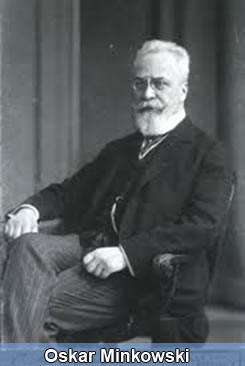
JDC GEMS Picture of the Month - Oskar Minkowski (1858-1931)
![]()
 Born in Alexoten, near Kaunas, now in Lithuania, on 13 January 1858.
Oskar Minkowski was legendary for his manual dexterity, and performed the world’s first successful hepatectomy (successful in that the creature did not expire immediately), upon a goose, in 1888.
Born in Alexoten, near Kaunas, now in Lithuania, on 13 January 1858.
Oskar Minkowski was legendary for his manual dexterity, and performed the world’s first successful hepatectomy (successful in that the creature did not expire immediately), upon a goose, in 1888.
![]() Minkowski worked with Josef von Mering on the study of diabetes at the University of Strasbourg. Their landmark study in 1889 in dogs induced diabetes by removing their pancreas.
Minkowski worked with Josef von Mering on the study of diabetes at the University of Strasbourg. Their landmark study in 1889 in dogs induced diabetes by removing their pancreas.
![]() It was Minkowski who performed the operation and made the crucial link to recognize that the symptoms of the treated dogs were due to diabetes.
It is to Minkowski’s credit that he made the mental connection between the polyuria resulting from the operation and diabetes, leading him to test the urine for glucose.
It was Minkowski who performed the operation and made the crucial link to recognize that the symptoms of the treated dogs were due to diabetes.
It is to Minkowski’s credit that he made the mental connection between the polyuria resulting from the operation and diabetes, leading him to test the urine for glucose.
![]() The European Association for the Study of Diabetes has, since 1966, awarded the Minkowski Prize for outstanding contributions to the advancement of knowledge in the field of diabetes mellitus.
The European Association for the Study of Diabetes has, since 1966, awarded the Minkowski Prize for outstanding contributions to the advancement of knowledge in the field of diabetes mellitus.
![]() His remains, together with those of his equally famous brother Hermann, are buried in the cemetery situated on Heerstrasse, Berlin, and are protected by the city of Berlin as an historical monument.
His remains, together with those of his equally famous brother Hermann, are buried in the cemetery situated on Heerstrasse, Berlin, and are protected by the city of Berlin as an historical monument.
For enquiries info@jothydev.net.
Please visit: jothydev.net | research.jothydev.com | diabscreenkerala.net | jothydev.com/newsletter
